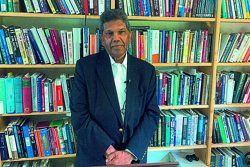The world yearns for more and more speed – speed of exchanged communications, immediate access to information, concept instantly converted into conception – is destroying an important part of our lives. We are losing the art of waiting awhile.
Consider the joy of writing and receiving letters. Delay is an essential ingredient in the pleasure of correspondence. “Must do” turns into the relished achievement of “just done” and then you have the added pleasure of anticipating a reply. “The sending of a letter constitutes a magical grasp upon the future,” Iris Murdoch wrote. But that old magic has been destroyed by the e-mail. Now letter-writing, and all too many pleasurably drawn-out exchanges between human beings, are carried out in a frenzy of instant messages instantly sent and almost simultaneously returned. No space is left for valuable periods of meditation and review when those second and third thoughts come which are often best.
I cannot, of course, really tell but surely it is this quality of waiting awhile with a purpose that can make pregnancy for many women such a uniquely redemptive experience, a time in their lives when they are released from the awful tyranny of do-it-now. Then simply to be – to eat, breathe, sleep, wait – is to do something very important. We have to remember as often as we can to wait awhile and let the world and its wonders happen to us.
There is a poem by James Wright, one of my great favourites, “Lying in a Hammock at William Duffy’s Farm in Pine Island, Minnesota”, which I like to read when life presses too hard on one’s precious time. I move it forward between the leaves of my diary so that I am reminded regularly what is, and what is not, important in life.
Over my head, I see the bronze butterfly,
Asleep on the black trunk,
Blowing like a leaf in green shadow.
Down the ravine behind the empty house
The cowbells follow one another
Into the distances of the afternoon.
To my right,
In a field of sunlight between two pines,
The droppings of last year’s horses
Blaze up into golden stones.
I lean back, as the evening darkens and comes on.
A chicken hawk floats over, looking for home.
I have wasted my life.
The poem itself confirms the irony of its last line. It is not this experience of a world where nothing is lost, where tranquil beauty is contained in each passing moment, where dung blazes up like gold, it is not such an experience which is a waste of life. It is rather that in such an experience one realizes that a lifetime only of dutiful, anxious, unrelieved effort is utterly foolish, a waste in truth.
The novelist Kurt Vonnegut once spoke in an interview about technology and himself. He worked at home and he said he could, if he wanted, have a computer by his bed and never have to leave it. But instead he used an old typewriter and afterwards marked up the pages with a pencil and went down to the local post office to mail the pages to a good typist he knew. And in the line at the post office and later in the line at the corner store where he bought pencils and newspapers and sweets he got to talk to any number of people – a birdwatcher desperately eager to get back to tracking blue-birds in the woods, a girl he fell half in love with, an off-duty cop full of stories – and he lazed around noticing the way shadows fall and the intricate lace of an old woman’s shawl. And then he would walk home slowly. “And I’ve had a hell of a good time. I tell you, as much as anything we are here on Earth to fart around and don’t let anybody tell you any different.”
Well, yes, I suppose that is one way of expressing what is important in life. But in considering how to live well, and not end up disillusioned and regretful, keep another poem close at hand always – Derek Walcott’s great poem:
Love After Love
The time will come
when, with elation,
you will greet yourself
at your own door, in your own mirror,
and each will smile at the other’s welcome,and say sit here. Eat.
You will love again the stranger who was your self.
Give wine, give bread, give back your heart
to itself, to the stranger who has loved youall your life, whom you ignored
for another, who knows you by heart.
Take down the love-letters from the bookshelf,the photographs, the desperate notes,
peel your own image from the mirror.
Sit. Feast on your life.










